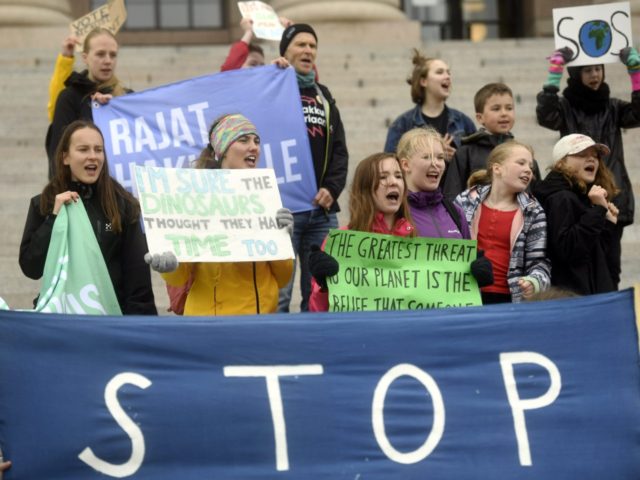A growing number of children are being treated for an overwhelming terror of “environmental doom” as climate alarmists spread fears of an impending climate disaster, the Daily Telegraph has reported.
“Protests by groups such as Extinction Rebellion, the recent fires in the Amazon and apocalyptic warnings by the teenage activist Greta Thunberg have prompted a ‘tsunami’ of young people seeking help,” the Telegraph’s science correspondent reported Monday.
“A lot of parents are coming into therapy asking for help with the children and it has escalated a lot this summer,” said psychotherapist Caroline Hickman of the Climate Psychology Alliance (CPA).
“The symptoms are the same [as clinical anxiety], the feelings are the same, but the cause is different,” she said. “The fear is of environmental doom — that we’re all going to die.”
A spike in psychological trauma over global warming should come as no surprise, since climate alarmists have been intentionally amping up the rhetoric over a looming environmental apocalypse.
As Breitbart News has reported, activists have studied people’s emotional response to climate expressions and purposefully selected the terminology that elicits the strongest reaction.
In July 2018, the Berkeley City Council in California issued a resolution declaring a worldwide “climate emergency,” calling it “the greatest crisis in history” after evoking memories of World War II.
The following month, Salon magazine announced it is time to “start panicking” over climate change.
“It is time for us to panic about global warming,” wrote Salon contributor Matthew Rozsa. “Indeed, a proper state of panic is long overdue.”
Last May, the Guardian newspaper released updates to its official in-house style guide intended to sharpen its climate change rhetoric in order to alarm readers and motivate them to action.
“Instead of ‘climate change’ the preferred terms are ‘climate emergency, crisis or breakdown’ and ‘global heating’ is favoured over ‘global warming,’ although the original terms are not banned,” the Guardian stated.
“The phrase ‘climate change,’ for example, sounds rather passive and gentle when what scientists are talking about is a catastrophe for humanity,” said Katharine Viner, the Guardian’s editor-in-chief and a firm believer in the impending climate apocalypse.
“Increasingly, climate scientists and organisations from the UN to the Met Office are changing their terminology, and using stronger language to describe the situation we’re in,” she said.
Even Pope Francis has been adopting stronger rhetoric to describe what he sees as a climate emergency around the globe.
In his recent Message for the World Day of Prayer for the Care of Creation, the pope employed the apocalyptic language encouraged by climate alarmists.
Human beings have caused “a climate emergency that gravely threatens nature and life itself,” he said, urging “drastic measures” to fight global warming.
As activists attempt to scare people into becoming eco-warriors, it is no surprise that children are suffering psychologically as a result, since they do not possess the critical thinking skills necessary to separate the facts from the hype. When they hear that the world is ending or that human civilization has only ten years to exist, they tend to believe it.
The Climate Psychology Alliance said psychiatric drugs have been administered to some children complaining of eco-anxiety. The group is now pushing for official recognition of eco-anxiety as a psychological phenomenon.
In 2017, the American Psychological Association released a report acknowledging the impact of eco-anxiety and calling for further research into the mental health consequences of climate change.
Ms. Hickman said that parents should learn to use gentler language in talking to their children about global warming.
“What you don’t want is that child to collapse in a well of depression saying ‘what’s the point in going to university,’ or ‘what’s the point of doing my exams,’ which I have heard children say,” Hickman stated.

COMMENTS
Please let us know if you're having issues with commenting.